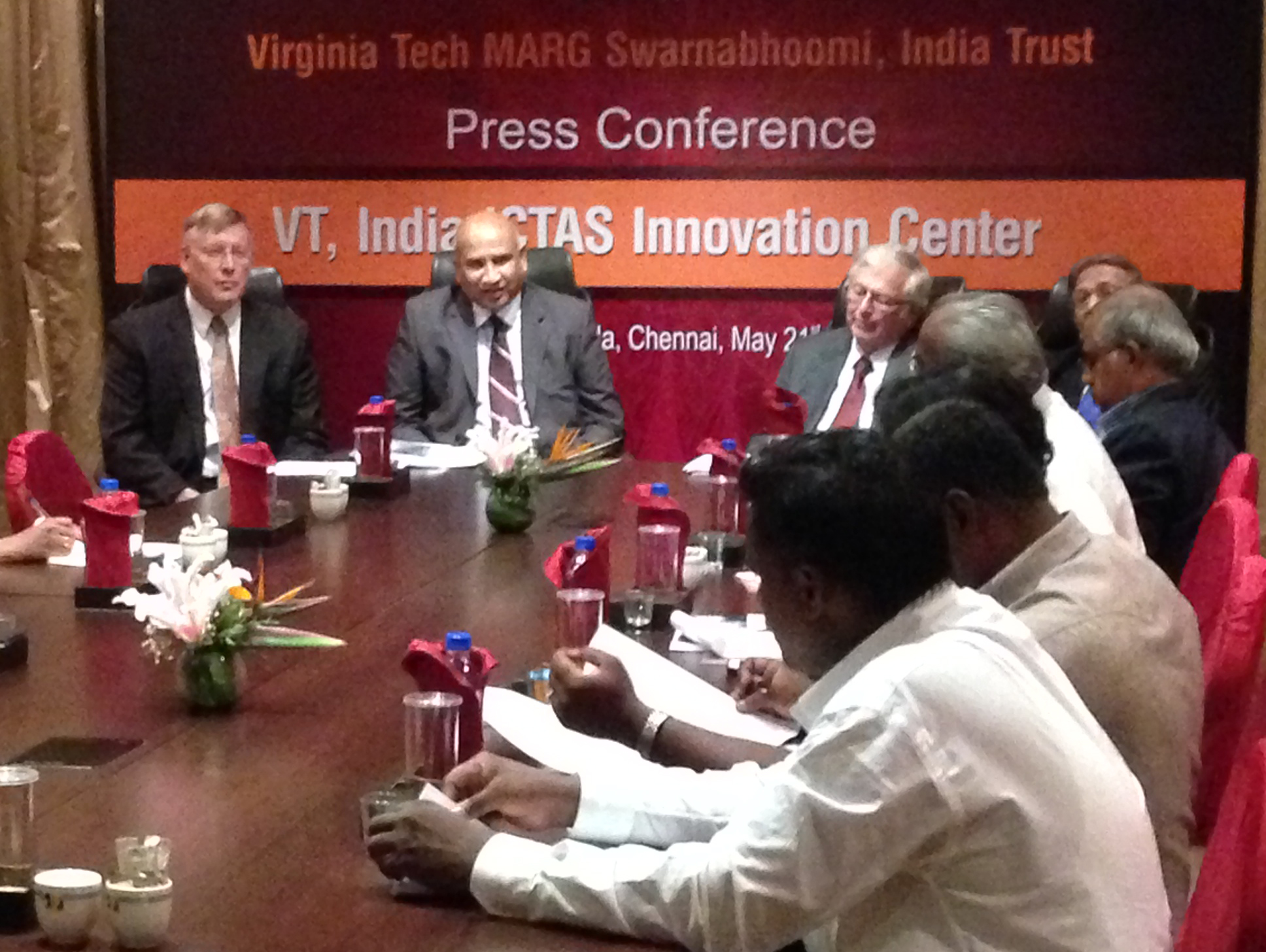Governor announces the opening of Virginia Tech's research laboratory in India

Editor’s Note: Since the article’s original date of publication, Virginia Tech’s partnership with MARG Swarnabhoomi has dissolved, ending plans to inhabit the 6,000-square-foot lab in the Amrita Research Park. Virginia Tech’s major enterprise has since moved to Maduravoyal, Chennai, about two hours away and close to Mahindra World City. In Chennai – and at a new site at the Virginia Tech Corporate Research Center in Blacksburg – Virginia Tech researchers and scientists are collaborating with Mahindra engineers to create next-generation “smart” farm equipment.
Four years in the making, Virginia Tech's research laboratory in India opens today with Virginia Tech President Charles W. Steger presiding over the ribbon cutting.
A built-to-specs laboratory is outfitted with equipment enabling researchers to harvest energy in new ways from waves, sun, and wind, as well as mechanical vibration such as railroad trains produce.
Soon the 6,000-square-foot lab will feature a state-of-the-art wind tunnel where researchers can develop high-efficiency wind turbines by optimizing their aerodynamic and structural performance.
"We are crossing continents to meet the global demand for new energy technology development," said Virginia Gov. Terence R. McAuliffe. "The insights we gain and the technology we create all transfer back to Virginia, and we can apply those assets to build new industry, address U.S. energy challenges, and create a 21st century Virginia economy."
For Steger, the campus in India is a way to marry Virginia Tech's high-tech research edge with its tradition of putting new ideas and inventions into practice for the world's betterment.
"We have an opportunity to expand beyond our neighbors in Western Europe into Asia, creating a global enterprise focused on one of the most important research areas for humankind – energy," Steger said.
India is the ideal place for such research, said Guru Ghosh, vice president for outreach and international affairs at Virginia Tech.
"Virginia Tech is setting a team to work that will refine and adapt windmills and solar panels for use in households in rural India. This is vital to reducing poverty where hundreds of thousands of people live off the grid. Uplifting lives in India and elsewhere rests on the world's capacity to produce enough electricity for everyone."
In March 2010, Virginia Tech announced plans for a center called VT, India to be located on 30 acres in the state of Tamil Nadu in southeast India, within a two-hour drive of Chennai (formerly known as Madras). Chennai is India’s fourth largest city and the capital of Tamil Nadu. The center sits inside the Amrita Research Park, where ocean breezes are conducive to windmill research.
As work proceeded with private-sector partner MARG Swarnabhoomi, which contributed almost $2 million to the laboratory build-out, two of Virginia Tech's research entities developed prominent roles: the Center for Energy Harvesting Materials and Systems and the Institute for Critical Technology and Applied Science. The campus was called the VT, India Institute for Critical Technology and Applied Science Innovation Center.
"The research will become part of our global effort on energy-harvesting under the umbrella of a National Science Foundation Center for Energy Harvesting Materials and Systems," said Roop Mahajan, director of the Institute for Critical Technology and Applied Science on the Blacksburg campus. "Communication and interaction between the two centers, in Swaranabhoomi and Blacksburg, will ensure a seamless integration of research projects and goals."
Virginia Tech researchers already have brought the cost of wind energy down to about $1 per watt, enabling the technology to be deployed for household use.
"We will use hybrid composite materials to design light wind turbine blades with a high lift coefficient and optimum performance at low wind speeds," Mahajan explained, making the turbines even more affordable for individual households and small communities.
Research will also involve experiments with the reel-to-reel manufacture of flexible, dye-sensitized solar cells, seen as a promising source of renewable energy. Also in the future, according to Mahajan, "Building on the success and knowledge gained in energy harvesting, we will expand our research enterprise into other areas including nanotechnology and wireless communication."

Press conference VT India
Reporters interview leadership from Virginia Tech and its Indian partner, MARG, at a news conference today in Chennai, India, announcing the opening of VT, India ICTAS Innovation Center. Pictured at end of the table, left to right, are Richard Benson, dean of the College of Engineering at Virginia Tech; G.R.K. Reddy, MARG president; and Virginia Tech President Charles Steger.







